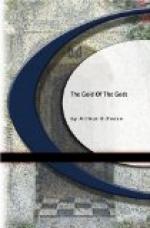There he was over in the corner, sprawled out in a chair, a tank of oxygen beside him, from which he was inhaling laboriously copious draughts. He rose as he saw us and walked unsteadily toward the table.
“Why—what’s the matter?” I cried, certain that m our absence an attempt had been made on his life, perhaps to carry out the threat of the curse.
“N-nothing,” he gasped, with an attempt at a smile. “Only I—think I was right—about the poison.”
I did not like the way he looked. His hand was unsteady and his eyes looked badly. But he seemed quite put out when I suggested that he was working too hard over the case and had better take a turn outdoors with us and have a bite to eat.
“You—you got it?” he asked, seizing the package that contained the gourd and unwrapping it nervously.
He laid the gourd on the table, on which were also several jars of various liquids and a number of other chemicals. At the end of the table was a large, square package, from which sounds issued, as if it contained something alive.
“Tell me,” I persisted, “what has happened. Has any one been here since we have been gone?”
“Not a soul,” he answered, working his arms and shoulders as if to get rid of some heavy weight that oppressed his chest.
“Then what has happened that makes you use the oxygen?” I repeated, determined to get some kind of answer from him.
He turned to Leslie. “It was no ordinary asphyxiation, Doctor,” he said quickly.
Leslie nodded. “I could see that,” he admitted.
“We have to deal in this case,” continued Kennedy, his will-power overcoming his weakness, “with a poison which is apparently among the most subtle known. A particle of matter so minute as to be hardly distinguishable by the naked eye, on the point of a lancet or needle, a prick of the skin not anything like that wound of Mendoza’s, were necessary. But, fortunately, more of the poison was used, making it just that much easier to trace, though for the time the wound, which might itself easily have been fatal, threw us off the scent. But given these things, not all the power in the world—unless one was fully prepared—could save the life of the person in whose flesh the wound was made.”
Craig paused a moment, and we listened breathlessly.
“This poison, I find, acts on the so-called endplates of the muscles and nerves. It produces complete paralysis, but not loss of consciousness, sensation, circulation, or respiration until the end approaches. It seems to be one of the most powerful agents of which I have ever heard. When introduced in even a minute quantity it produces death finally by asphyxiation—by paralyzing the muscles of respiration. This asphyxia is what puzzled you, Leslie.”
He reached over and took a white mouse from the huge box on the corner of the table.
“Let me show you what I have found,” he said. “I am now going to inject a little of the blood serum of the murdered man into this white mouse.”




